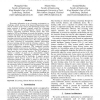226 search results - page 45 / 46 » Tuning experiments with an adaptive computational framework |
CCECE
2006
IEEE
14 years 1 months ago
2006
IEEE
Presenting information to an e-learning environment is a challenge, mostly, because ofthe hypertextlhypermedia nature and the richness ofthe context and information provides. This...
ATAL
2010
Springer
13 years 8 months ago
2010
Springer
Multi-agent learning is a crucial method to control or find solutions for systems, in which more than one entity needs to be adaptive. In today's interconnected world, such s...
TKDE
2012
11 years 10 months ago
2012
—Traditional clustering techniques are inapplicable to problems where the relationships between data points evolve over time. Not only is it important for the clustering algorith...
KDD
2004
ACM
14 years 8 months ago
2004
ACM
Essentially all data mining algorithms assume that the datagenerating process is independent of the data miner's activities. However, in many domains, including spam detectio...
SIGIR
2009
ACM
14 years 2 months ago
2009
ACM
Social network systems, like last.fm, play a significant role in Web 2.0, containing large amounts of multimedia-enriched data that are enhanced both by explicit user-provided an...

